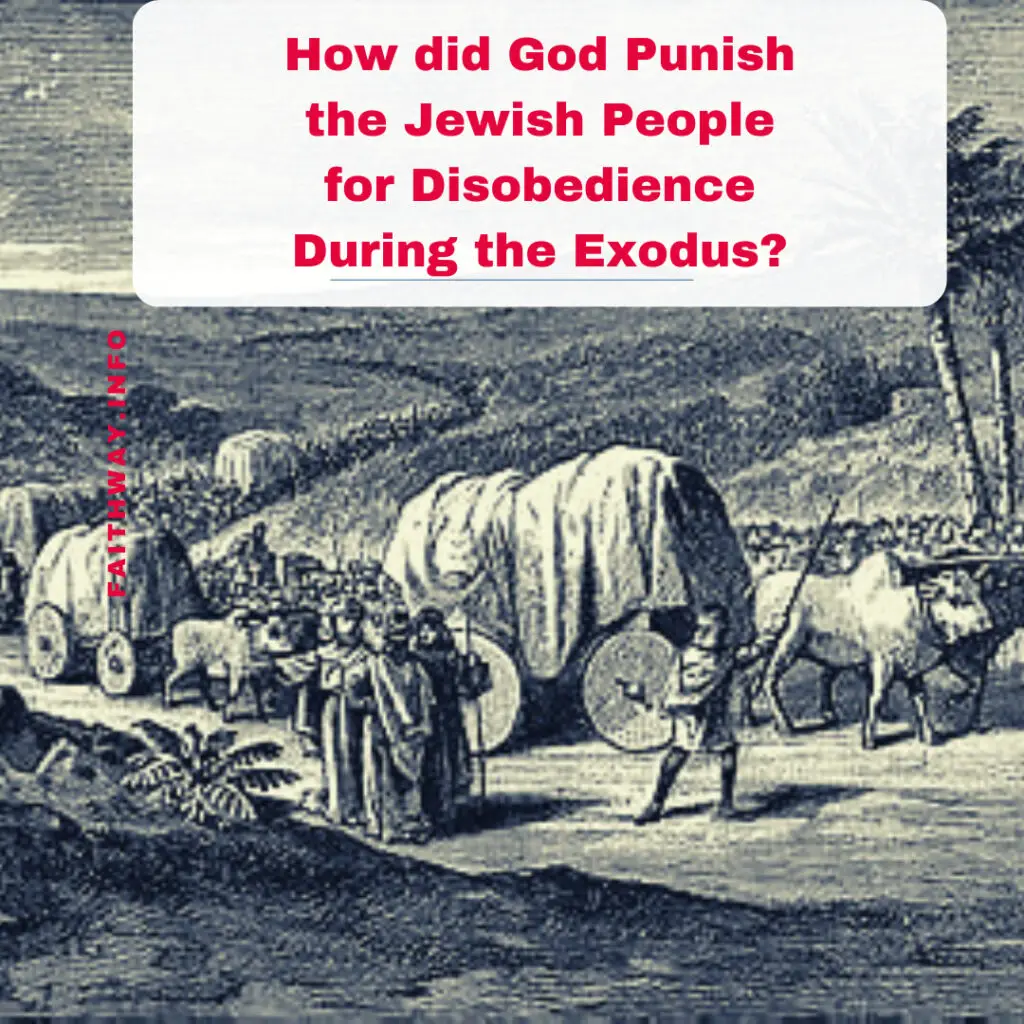The punishment of the Jewish people for disobedience during the Exodus was a significant event in biblical history. God’s retribution served as a stern reminder of the consequences that awaited those who strayed from His commandments. In this blog post, we will explore the various ways in which God punished the Jewish people during their journey from Egypt to the Promised Land.
From plagues to wandering in the wilderness, these acts of divine discipline left an indelible mark on the Israelites and emphasized the importance of obedience in their covenant with God.
Join us as we delve into this fascinating chapter of biblical narrative and gain insights into the consequences that befell the Jewish people for their disobedience.
The Covenant between God and the Jewish People
The Covenant between God and the Jewish people is a foundational aspect of Jewish history and religious belief. It represents a sacred agreement, filled with promises and expectations, between God and the Israelites. This section will explore the key elements of this covenant, including the promises made by God and the consequences that awaited the Jewish people for disobedience.
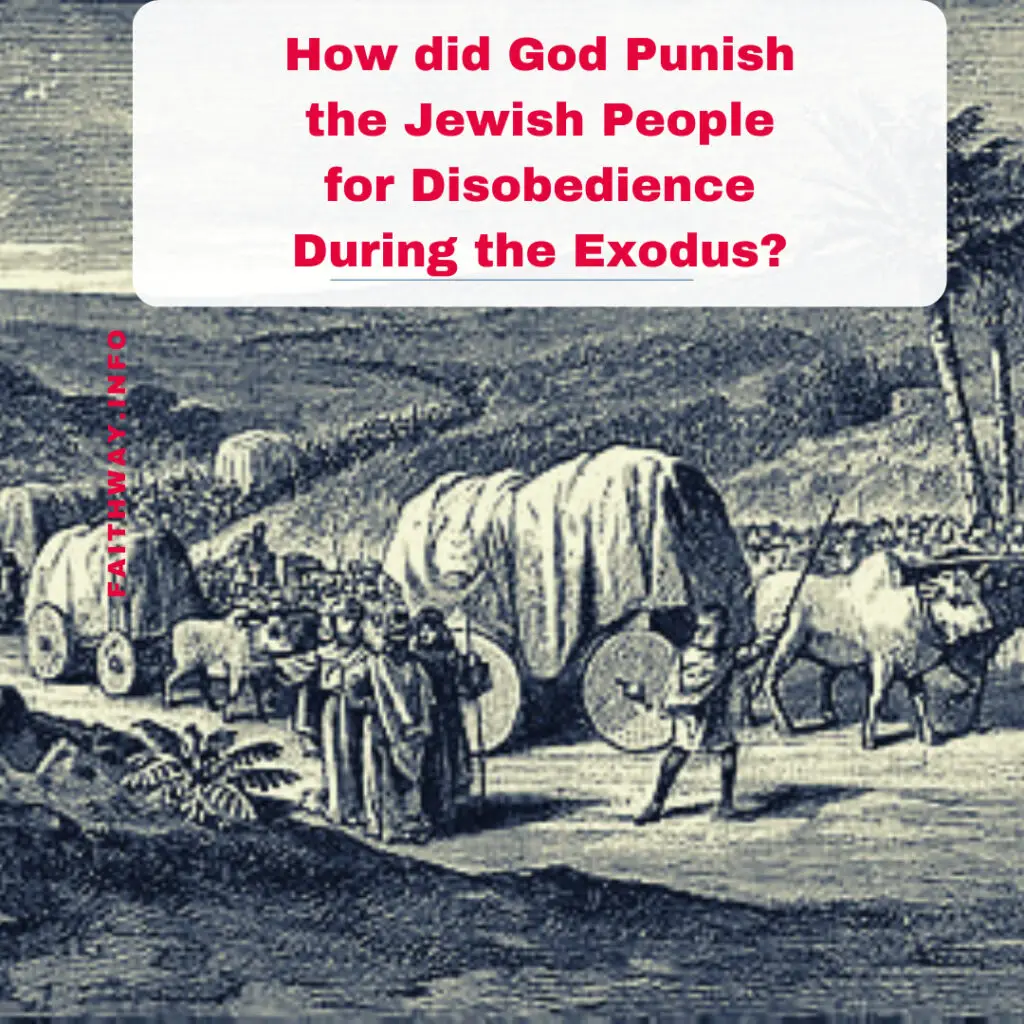
The Promises and Expectations
God made several promises to the Jewish people as part of the covenant. These promises were meant to ensure the prosperity and well-being of the Israelites if they remained faithful and obedient. The promises included:
- Land: God promised to give the Jewish people the land of Canaan as their inheritance. This land was described as flowing with milk and honey, symbolizing abundance and fertility.
- Protection: God vowed to protect the Israelites from their enemies and provide a shield of divine defense. He would be their “rock” and “fortress” in times of trouble.
- Blessings: In exchange for their loyalty, God promised to bestow blessings upon the Jewish people. These blessings encompassed various aspects of life, such as fertility, prosperity, and spiritual guidance.
However, along with these promises came certain expectations. God expected the Jewish people to:
- Obey His Commandments: The Israelites were required to follow the laws and commandments set forth by God through Moses. These commandments encompassed both moral and religious obligations.
- Worship Only Him: God demanded exclusive worship and prohibited the Israelites from worshipping other gods or idols. He emphasized monotheism as a core principle of their faith.
- Maintain Ritual Purity: The Jewish people were required to observe various rituals and practices to maintain purity before God. These included circumcision, dietary laws, and observance of sacred holidays.
The Consequences of Disobedience
While the covenant offered numerous promises, it also carried severe consequences for disobedience. God warned the Israelites that failing to uphold their end of the agreement would result in various punishments. These consequences included:
- Exile and Displacement: Disobedience could lead to exile from the Promised Land, with the Jewish people being uprooted from their ancestral homeland and forced to live as foreigners in foreign lands.
- Destruction and Defeat: God warned of the possibility of military defeat and the destruction of their cities and temples if they strayed from His commandments.
- Lack of Divine Protection: Disobedience meant the withdrawal of divine protection, exposing the Jewish people to harm from their enemies and natural disasters.
- Suffering and Hardship: God cautioned that disobedience would bring about suffering and hardship, both individually and collectively, as a consequence of straying from His path.
These consequences were meant to serve as a deterrent and a reminder of the importance of remaining faithful to the covenant.
It is essential to understand the historical and religious significance of the covenant between God and the Jewish people to appreciate the context of how disobedience during the Exodus was believed to be punished. By examining the promises and expectations of the covenant, as well as the potential consequences of disobedience, we gain insight into the spiritual and moral framework that guided the Israelites’ journey.
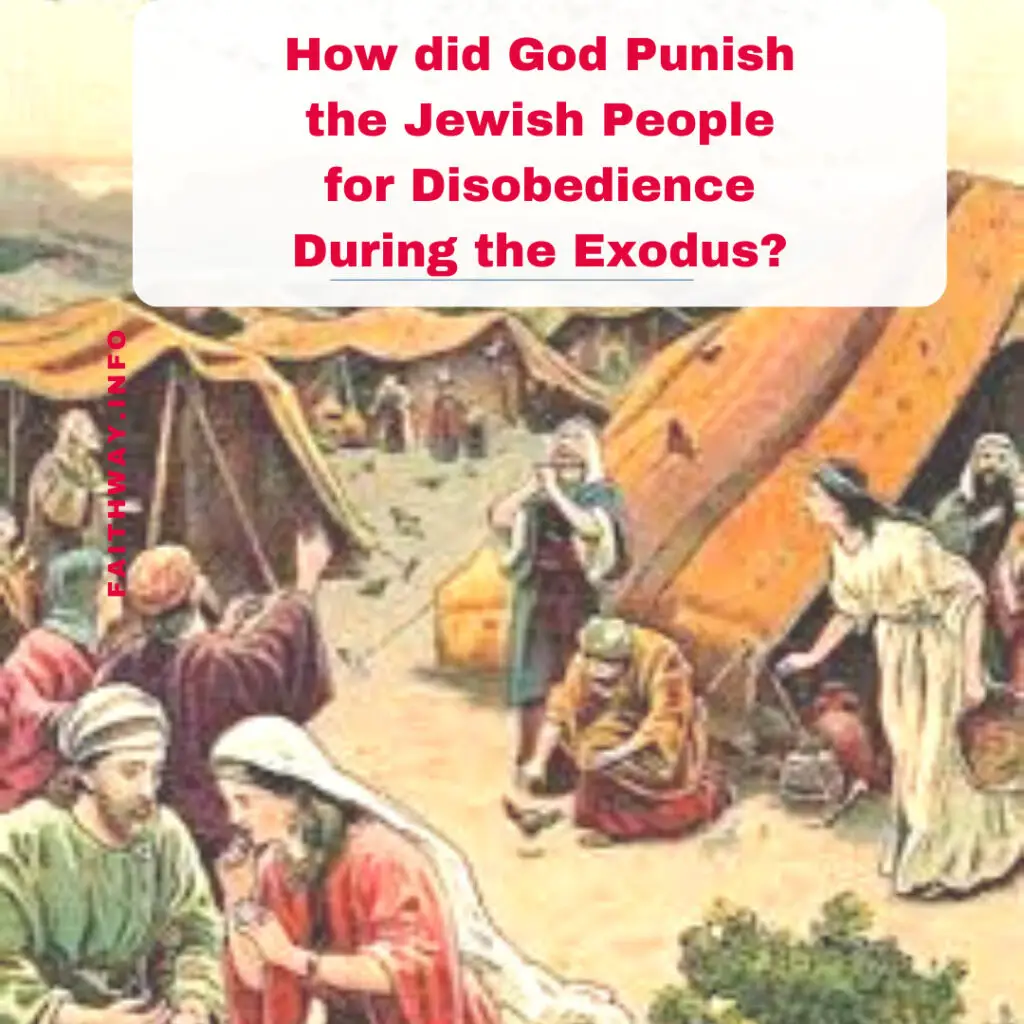
Plagues as a Punishment
The plagues during the time of the Exodus are widely regarded as one of the most striking and memorable events in biblical history. They were a series of ten supernatural disasters that God brought upon the Egyptian people as a punishment for their refusal to release the Jewish people from slavery. Not only were these plagues a demonstration of God’s power, but they also had a profound impact on the Jewish people themselves.
The Ten Plagues of Egypt
The Ten Plagues of Egypt were a series of calamities that struck Egypt, each one more severe than the last. They were meant to serve as both a punishment for Pharaoh’s refusal to let the Israelites go and as a demonstration of God’s authority. Let’s take a closer look at each of these plagues:
- Water turned to blood: The Nile River and all sources of water in Egypt turned to blood, making it undrinkable and causing widespread devastation.
- Frogs: Egypt was overrun with frogs, filling every corner of the land, including people’s homes and even their beds.
- Gnats: Swarms of gnats plagued the Egyptians, causing irritation and discomfort.
- Flies: Egypt was infested with swarms of flies that multiplied rapidly, causing further distress.
- Livestock Diseased: All the livestock in Egypt, belonging to both the Egyptians and the Israelites, were struck with a plague, leading to economic devastation.
- Boils: Painful boils and sores afflicted both humans and animals throughout Egypt.
- Hail: A severe hailstorm struck Egypt, destroying crops and properties.
- Locusts: Swarms of locusts descended upon the land, devouring all the remaining crops and vegetation.
- Darkness: A thick darkness engulfed Egypt for three days, so dense that it could be felt.
- Death of the Firstborn: The most devastating plague of all, the firstborn sons of all Egyptians, including Pharaoh’s own son, were struck dead.
The Impact on the Jewish People
While the Ten Plagues were primarily aimed at punishing the Egyptians, they had a significant impact on the Jewish people as well. Let’s explore how these plagues affected the Israelites:
- Protection: Throughout all the plagues, the Israelites were protected from their devastating effects. This served to demonstrate God’s favor and protection towards his chosen people.
- Separation: The plagues created a clear distinction between the Egyptians and the Israelites, reinforcing the idea of the Israelites as a distinct and separate nation.
- Faith and Trust: Witnessing the power of God through the plagues strengthened the faith and trust of the Israelites in Him. They saw firsthand that God was actively working on their behalf, fulfilling His promise to deliver them from bondage.
- Confirmation of God’s Power: The plagues not only served as a punishment to the Egyptians but also as undeniable proof of God’s supremacy and authority. The Israelites witnessed the limitations of the Egyptian gods and were reminded of God’s power and ability to deliver.
In conclusion, the ten plagues of Egypt were a series of supernatural events designed to punish the Egyptians for their refusal to let the Jewish people go. The plagues served as a demonstration of God’s power and had a profound impact on both the Egyptians and the Israelites.
While the Egyptians suffered the devastating consequences, the plagues served to strengthen the faith, trust, and belief in the Israelites that God would deliver them from slavery.
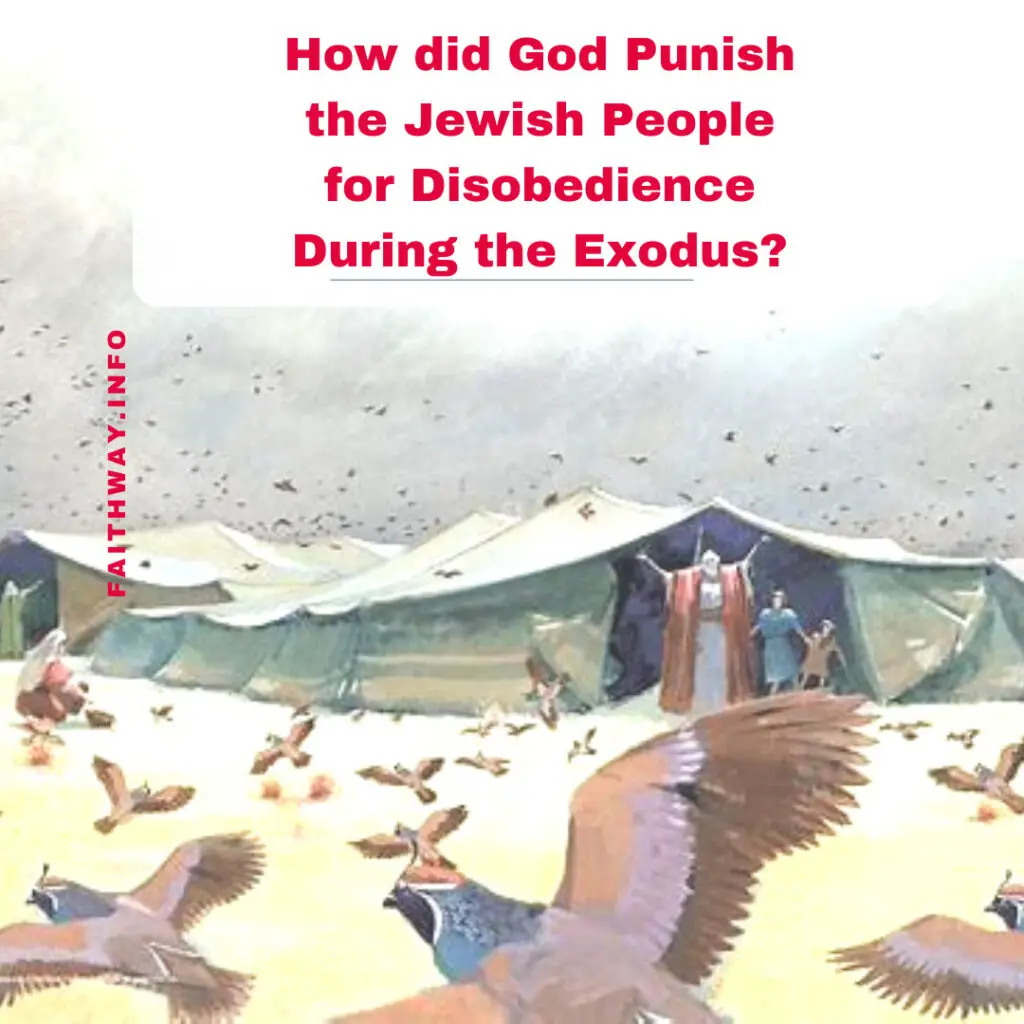
Wandering in the Wilderness
During the time of the Exodus, after being delivered from slavery in Egypt, the Jewish people found themselves wandering in the wilderness for forty years. This period of wandering was filled with both challenges and divine punishments as God addressed the disobedience of the Israelites. In this section, we will explore two significant incidents that occurred during this time: The Golden Calf Incident and God’s Wrath and Punishment.
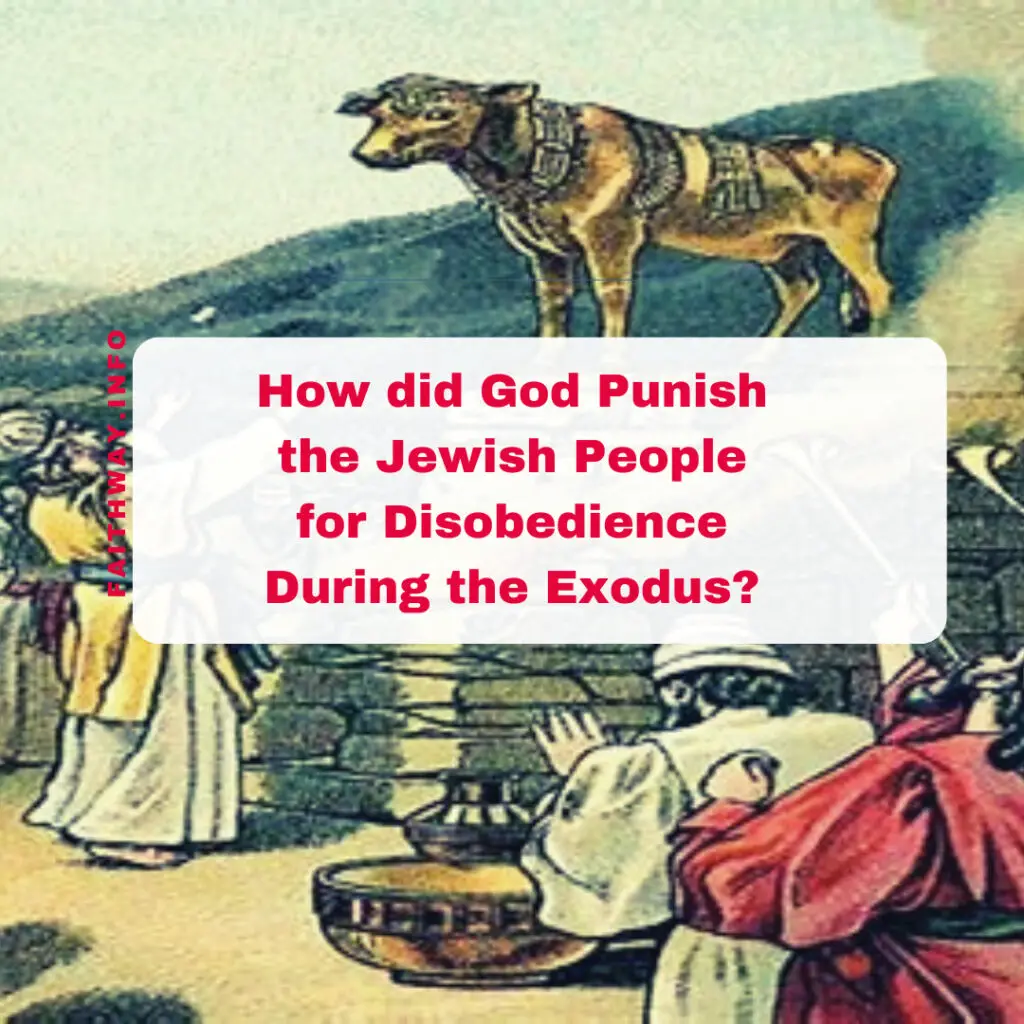
The Golden Calf Incident
One of the most notable events during the Israelites’ journey through the wilderness was the Golden Calf Incident. In their impatience and lack of trust, the people turned away from God and created a golden calf to worship instead. This act of idolatry was a direct violation of God’s commandments, particularly the prohibition against worshiping false gods.
In response to this disobedience, God’s anger was kindled, and His divine punishment became evident. Moses, upon witnessing the scene, destroyed the tablets of the Ten Commandments, symbolizing the breaking of the covenant between God and His people. God then declared His intention to punish the Israelites, expressing His disappointment and anger.
This incident serves as a powerful reminder of the consequences of disobedience and the importance of remaining faithful to God’s commandments.
God’s Wrath and Punishment

Following the Golden Calf Incident, God’s wrath and punishment fell upon the disobedient Israelites. The severity of these punishments was intended to instill discipline and bring about repentance. The consequences of their actions serve as a lesson for future generations.
One form of punishment was the withdrawal of God’s divine presence. As a result, the Israelites lost their guidance and protection, leaving them vulnerable to various hardships and challenges in the wilderness. They faced scarcity of food and water, encountered hostile tribes, and struggled with internal conflicts and divisions.
In addition to these trials, God also sent plagues upon the people, such as the plague of fiery serpents, to punish their continued disobedience and lack of faith. These afflictions served as a direct consequence of their actions and a reminder of the need for repentance and obedience.
Through these punishments, God sought to teach His people the importance of faithfulness, obedience, and trust in Him. The wilderness became a testing ground, a place where the Israelites could learn and grow in their relationship with God.
In conclusion, the period of wandering in the wilderness was a time of divine punishment for the disobedience of the Jewish people during the Exodus.
The Golden Calf Incident and God’s wrath and punishment were significant events that underscored the consequences of turning away from God’s commandments. It serves as a reminder for us all to remain steadfast in our faith and obedient to God’s teachings.

Lack of Entry into the Promised Land
After their miraculous escape from Egypt and the forty years of wandering in the wilderness, the Jewish people were on the cusp of reaching the Promised Land. However, their disobedience to God’s commands led to severe consequences, including their failure to enter the land flowing with milk and honey.
The Spies’ Negative Report
When the Israelites arrived at the outskirts of the Promised Land, Moses sent twelve spies, one from each tribe, to explore the territory. Their mission was to gather information about the land and its inhabitants.
Unfortunately, upon their return, ten of the twelve spies gave a negative report, spreading fear and doubt among the people. They described the land as filled with formidable giants and impenetrable fortifications. Their discouraging report overwhelmed the faith of the people, causing them to lose confidence in God’s promise.
Forty Years of Wandering
The consequence of the Israelites’ lack of faith was a divine punishment: forty years of wandering in the wilderness. Instead of entering the Promised Land immediately, the Israelites were condemned to roam the desert for an entire generation. During this time, they experienced numerous hardships, including scarcity of food and water, attacks from hostile nations, and internal strife.
The desert became a testing ground for the Jewish people, where they had to learn humility, obedience, and dependence on God. It was a period of refining their character and purging the generation tainted with doubt. Only the younger generation, free from the influence of disbelief, would have the privilege of entering the land promised to their ancestors.
During those four decades, the Israelites were taught important lessons about trust, perseverance, and the consequences of disobedience. The wandering served as a reminder of the price they had paid for their lack of faith and a chance for the new generation to learn from their ancestors’ mistakes.
In conclusion, the lack of entry into the Promised Land was a direct result of the Israelites’ disobedience and lack of faith. The negative report provided by the spies and the subsequent doubt among the people triggered a chain of events that led to their forty years of wandering in the wilderness.
However, this period of exile served as a transformative experience for the new generation, preparing them to finally enter and conquer the land promised to them by God.
The Destruction of the First Temple
The destruction of the First Temple marks a significant event in the history of the Jewish people. This section explores the Babylonian invasion and the subsequent exile of the Jewish people.
The Babylonian Invasion
The Babylonian invasion, led by King Nebuchadnezzar II, took place in 586 BCE. The Babylonians besieged Jerusalem, leading to the destruction of the First Temple. This event had severe consequences for the Jewish people and their religious practices.
The Babylonian invasion was a result of the Jewish people’s disobedience and failure to heed the warnings of their prophets. Despite numerous calls for repentance and turning back to God, they continued to engage in idolatry and other sinful practices. This disobedience ultimately led to the destruction of their holiest site.
The Exile of the Jewish People
Following the Babylonian invasion, the Jewish people were exiled from their homeland and taken captive to Babylon. This period of exile, known as the Babylonian Captivity, lasted for approximately 70 years and had a profound impact on the Jewish community.
During their exile, the Jewish people faced various challenges, including adapting to a foreign culture and being separated from their spiritual center. However, it was during this time that the foundations of Judaism were strengthened. The exiled Jewish community worked to preserve their religious and cultural traditions, even in a foreign land.
The destruction of the First Temple and the subsequent exile served as a punishment for the disobedience of the Jewish people. It was a time of reflection and a call for them to return to their faith and rectify their actions.
Image Placeholder: Temple Ruins

Frequently Asked Questions about How God Punished the Jewish People for Disobedience During the Exodus
1. How did God punish the Jewish people during the Exodus?
- God punished the Jewish people during the Exodus by sending various plagues, inflicting illness and death, and causing them to wander in the desert for 40 years.
2. What were the plagues sent by God during the Exodus?
- The plagues sent by God during the Exodus included turning the water of the Nile River into blood, sending swarms of frogs, bringing forth gnats and flies, causing livestock to die, sending boils, hailstorms, locusts, and darkness, and ultimately, the killing of the firstborn of Egypt.
3. Why did God send these plagues to punish the Jewish people?
- God sent these plagues as a form of punishment to the Jewish people to demonstrate His power over the Egyptian gods and to convince Pharaoh to release the Israelites from slavery.
4. How did God inflict illness and death as punishment during the Exodus?
- God inflicted illness and death as punishment during the Exodus by causing a plague of boils, sending hailstorms that killed people and animals, and ultimately, killing the firstborn of Egypt.
5. Why did God make the Jewish people wander in the desert for 40 years?
- God made the Jewish people wander in the desert for 40 years as a consequence of their disobedience and lack of faith. He wanted to teach them humility, discipline, and dependence on Him before allowing them to enter the Promised Land.
6. What other forms of punishment did God impose during the Exodus?
- In addition to the plagues and wandering in the desert, God also punished the Jewish people by allowing them to face various hardships, challenges, and battles against hostile nations during their journey towards the Promised Land.
7. How did the Jewish people respond to God’s punishment during the Exodus?
- The Jewish people responded to God’s punishment during the Exodus with a mix of fear, repentance, rebellion, and faithlessness. Some acknowledged their wrongdoing and sought forgiveness, while others questioned God’s intentions and rebelled against His commands.
8. Did God offer any mercy or forgiveness during the Exodus?
- Yes, despite the punishments, God also showed mercy and forgiveness to the Jewish people during the Exodus. He provided them with food (manna), water from a rock, and guidance through the pillar of cloud and fire, demonstrating His love and care for His chosen people.
9. How did the punishments during the Exodus shape the Jewish people’s relationship with God?
- The punishments during the Exodus served as a means of discipline and testing for the Jewish people, ultimately shaping their understanding of God’s power, justice, and faithfulness. It reinforced the importance of obedience and trust in their relationship with God.
10. Are the punishments during the Exodus still relevant today?
- While the specific punishments during the Exodus are not directly applicable today, the underlying lessons of obedience, faith, and dependence on God remain relevant for people of faith. The Exodus serves as a reminder of the consequences of disobedience and the need for repentance.
Remember, if you have any more questions, feel free to ask.
Conclusion
In conclusion, the story of the Exodus from the Bible recounts how God punished the Jewish people for their disobedience during their journey. Despite being rescued from slavery in Egypt, the Israelites repeatedly rebelled and tested God’s patience.
As a result, they faced various consequences for their actions, including being denied entry into the Promised Land and wandering in the desert for 40 years.
These punishments served as a lesson for future generations to learn from, emphasizing the importance of obedience and faithfulness to God’s commandments. The story of the Exodus teaches us the significance of following God’s guidance and the consequences that can occur when we choose to disobey.

Faithway.info, your online sanctuary for deepening your spiritual journey and mastering the teachings of the Bible. At Faithway.info, we are passionate about making the wisdom of the Bible accessible to everyone, fostering a community dedicated to growth, understanding, and support.
